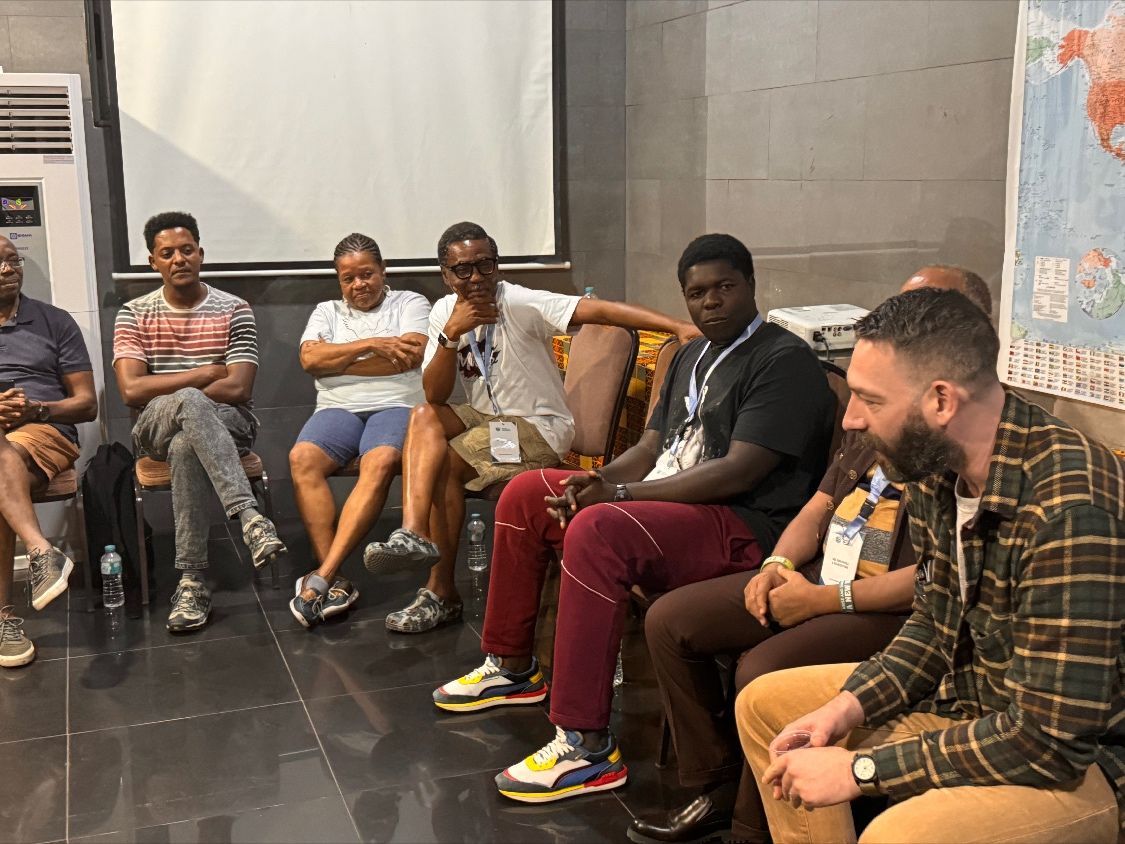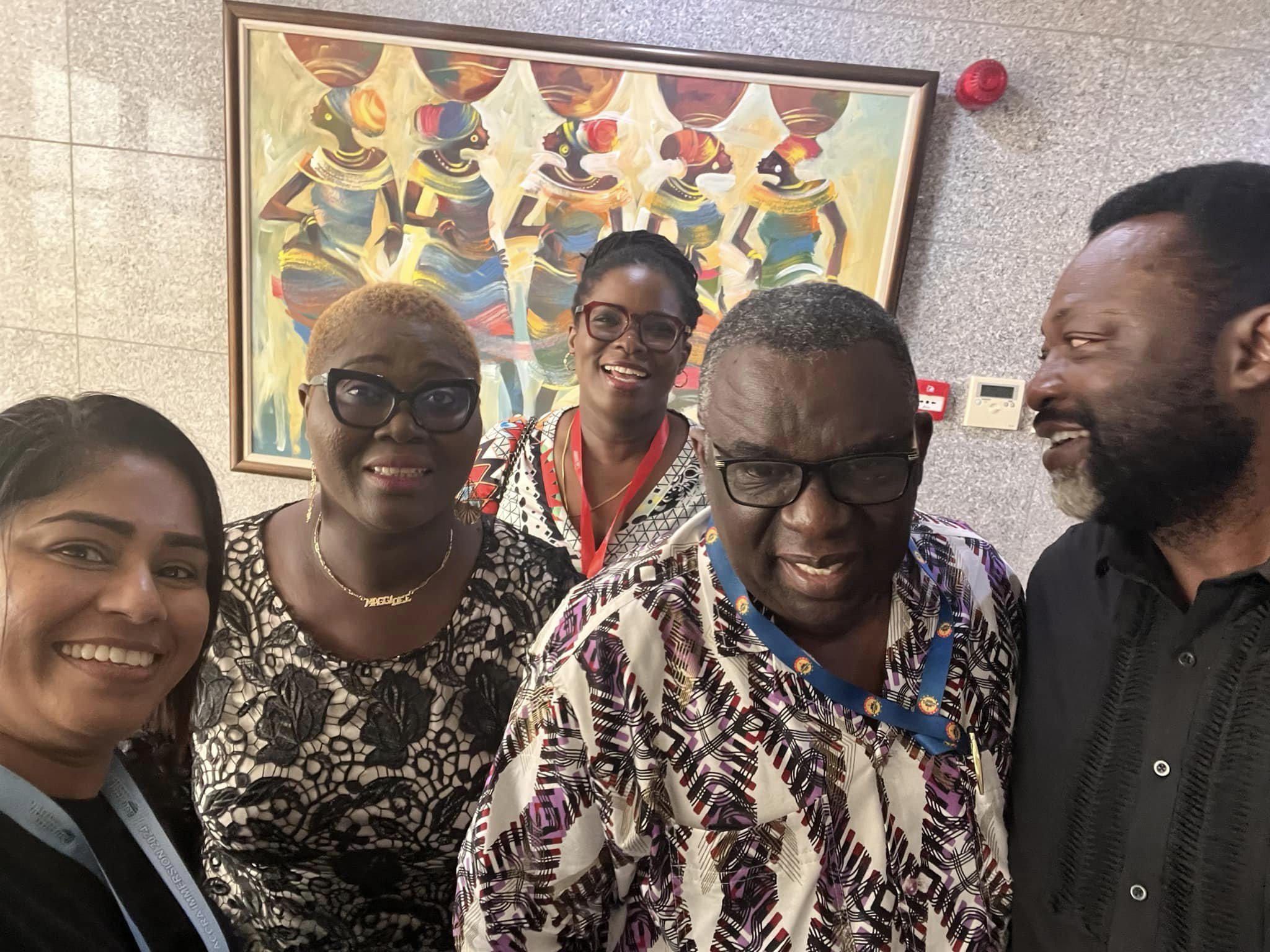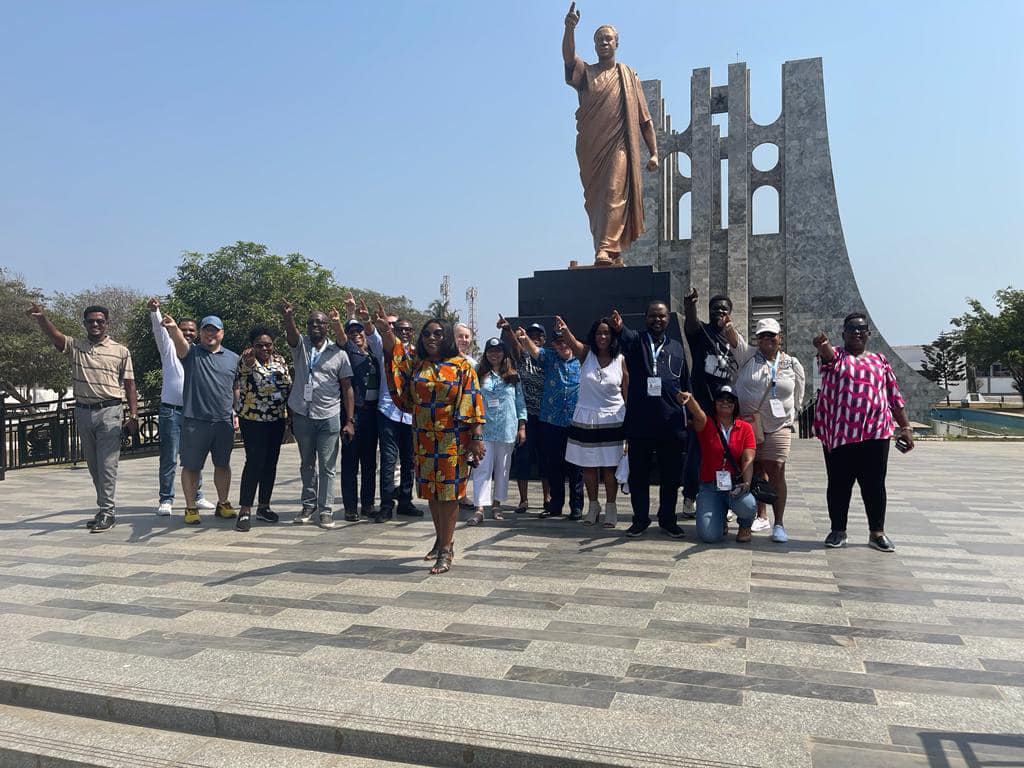
The Accra Immersion was a thrilling and fulfilling experience for me personally because as a Pan-Africanist with a deep desire to tell the African story to the world with a voice from within. The course is a continuation of Bakke Graduate University rich and distinctive tradition of offering leaders the unique opportunity of taking a plunge into cities and using the cities as laboratories for transforming research in seeking shalom and by transferring these learning practices to their own lives, ministries and cities in general.
The Immersion was intentionally themed: the COMPLEX WEB OF A DEFORMED PAST AND POTENTIALS FOR A TRANSFORMED FUTURE and this theme inspired the choice of vision sites selected for visitation and the resource persons who facilitated the in-class sessions for the 13 participants from 10 different nations. The intention was to look back at the rich but tainted history of Africa through the lens of Accra, Ghana.
Our site tour began with a trip under the able guidance of Dr. Ransom Affram, a BGU alumnus, who is a student of an earlier Accra Immersion led by Dr. Randy White. Dr. Ransom led us through Jamestown to the Museum dedicated to the iconic Kwame Nkrumah, the acclaimed father of the Ghanaian nation.
Jacqueline Geddes, PhD student had this to say about the experience:
What stood out for me was the repeated mention of the word “land”. It appeared that access to land, land ownership, and land usage played a major role in the development of the nation and continues to stir controversy. The most significant visit for me was to Kwame Nkrumah Memorial Park where he was buried. The guide eloquently provided valuable history about this great Pan-Africanist and freedom fighter who was the first Prime Minister of Ghana.

Several quotes by Nkrumah include: “I am not African because I was born in Africa but because Africa was born in me.” “As far as I am concerned, I am in the knowledge that death can never extinguish the torch which I have lit in Ghana and Africa. Long after I am dead and gone, the light will continue to burn and be borne aloft, giving light and guidance to all people."
We journeyed from that past into the present to see efforts aimed at building a society from the ruins of a deformed past with visits to the Parliament and had a session with the leadership of the congress. The present realities of the African continent won’t be fully understood without the effect of church, Christianity, and spirituality in general. The bittersweet story of Western colonialism cannot be fully told without the Christian component. The cohort visited three churches to expose the students to the state of the faith/gospel in the context/culture that they are immersed in. The consensus of opinion among the participants was the “western smell/fragrance” of most of the church expressions.
One of the PhD students from the nation of Rwanda, Donatha Gihana shared her experience:
I have over 15 years of professional experience in gender and women rights development work in Rwanda and other African countries. The urban churches visited today, showcased values for reflective and contextual leadership through the spiritual, social, and economic transformation work that they are doing. I was also thrilled to see the application and use of digital and technological skills throughout their church services, meaningful and active youth participation, however, a lot more needs to be done to encourage and support women leadership in such spaces.
The visit to the historic Elmina Castle could easily be described as the climax of this learning experience. The castle or appropriately described as a slave dungeon was built in 1482 by Portuguese slave traders to process slaves for exports. The visit was quite illuminating, depressing, filled with angst but also inspired the desire to build a world where human dignity is acknowledged, respected, and promoted. Dan Lee, a DMin student reflected on this experience:
Stepping into the haunting walls of Elmina Castle in Ghana, I was confronted with a truth that transcended mere knowledge. It was as if the weight of history itself settled upon my shoulders, reminding me of the unspeakable horrors that unfolded within these very walls. The stories of the captured Africans, their suffering, their pain, and their resilience echoed through the corridors, leaving an unforgettable mark on my soul.
“Elmina Castle will be a catalyst for change within me, Dan continues, it is igniting a fire within my heart, urging me to be a voice for the voiceless, to fight for justice, and to strive for a world where no one's humanity is ever violated again. As I walked away from that haunting place, I carried with me a renewed sense of purpose and a determination to make a difference. As the sign by the exit said, "May humanity never again perpetrate such injustice against humanity. We the living vow to uphold this."

The Accra Immersion was not all doom and gloom, there are obvious signs of hope for transformed future. The trip to one of the local businesses, Ele Agbe Shea Butter Factory founded by one of the students in the class, Mrs. Comfort Adjohe-Jennings offers much relief and hope. Dr. Shanti Persaud, a BGU alumnus who co-facilitated the course with me had this to say:
What Comfort is doing is exciting not only because she is a woman in business exporting her products to many nations and is a role model to many women in your city, but she also trains women to do what she does. Her mindset is a true example of what abundance looks like. Women often do not support other women, especially if they can become your competitors. Comfort, on the other hand, sees beyond this scarcity mindset and is involved in many community development projects as she is passionate not only for women's development but also for her country's development. I can see how God uses small things like Comfort's business to change people's lives significantly.
I must also commend the contribution of Dr. Brian Jennings, the co-professor for his valuable contribution to this learning experience, his session on Man Hero which he aptly re-titled 'On the Ally’s Journey’ in which he shared how in the course of his marriage to his wife Comfort, he had worked to become her ‘ally’ supporting her in her endeavors as a social entrepreneur. Brian’s presentation was quite inspiring and offers much hope for the gender disparity in Africa and globally. Africans need to resist being wounded soldiers, but scarred warriors.
I am thankful to BGU for the awesome honor of leading this learning experience in Africa.
Dr. Dot REJU
Professor of Record, Accra Immersion 2024